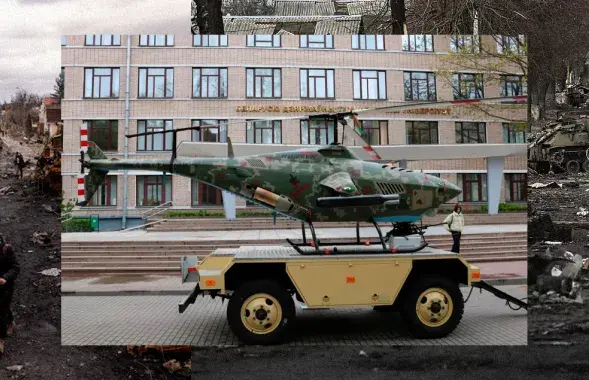Ecologist: Garbage disposals prevent effective sorting of waste
Representative of the Center for Ecological Decisions Yauhen Labanau has told Euroradio about the ways they struggle with waste in Belarus.
Euroradio: What do they do with the garbage in Belarus? Is it sorted or burned?
Yauhen Labanau: Yes, indeed, this issue is very complicated, and
sometimes it is solved in different ways in different cities. Currently,
most household waste (what we throw in the trash) goes to the big
dump. True, in major regional cities you can see yellow mesh containers
with the words "glass", "plastic", "paper" here
and there. This is what we call a separate collection. We are doing
it for some time already, somewhere it is more successful, somewhere -
less. However, from the perspective of an ecologist - a lot more could
have been done in this direction.
Euroradio:
And what happens with the waste that got sorted? Is
it recycled or does it go back to the common dump?
Yauhen
Labanau: Of
course not. In fact, this is not garbage - we call it raw materials:
paper, plastic, glass. There are technical possibilities to process it,
and currently different cities have different approaches to the issue. In
some cities - such as Minsk – they make separate containers for re-materials:
glass, plastic and paper – and put everything into one container. Then it
is transported to the sorting line (such a long conveyor belt), raw materials
are laid out, and people sort them by hands. What we do as city
inhabitants is called the initial sorting. Then, on the sorting line, these
initial secondary raw materials are very easy to sort on. Then it's all
recycled: paper waste - for production of new paper, plastic - for building
materials, the plastic waste, and there is a separate issue with the bottles -
most likely they go for productions of new glass.
Euroradio: What you just said
concerns the capital. What about small cities - what do they do with the
garbage? Do they have an opportunity to
sort it?
Yauhen Labanau: It
happens in different ways. Today,
almost every regional center has stations for sorting garbage. Somewhere
they work more successfully, somewhere – less. Homel makes a good example. Why? Because
they decided to weld up all garbage disposals some fifteen years ago. Therefore,
people take out the garbage to the containers. If
you put the garbage into a container - it is much easier to sort it out. One
of the problems that the environmental organizations overlooked is that the
presence of garbage disposals in the houses prevents separate garbage
collection. If
a person has a hole in the wall, he will be less likely to sort his garbage
into separate containers. Therefore, Homel did it in a very effective way.
Euroradio: And if you have a garbage disposal - should you stop using it?
Yauhen Labanau: First of
all, it is important to separate wet and dry waste, organic and inorganic. If
you do not throw away your paper or your bottles into a common container - you
do a very good job. A
lot depends on our position, on our initiative. If
you have no yard container for secondary raw materials - you can take paper
trash to the nearest school. The
schools are still collecting paper trash. We
must, of course, think where we can re-sell the raw materials. The
system is still evolving, and if you wait for the appearance of a container for
plastic and paper in your backyard, it may take several years.
Euroradio: Is it possible to achieve this personally? If the inhabitants bring a petition to the communal services unit, will they be provided such a container? Or should there be a corresponding resolution of the local authorities?
Yauhen Labanau: If
people show such an initiative, then such container will appear in their
backyard in the first place. If
there is such an initiative, the government should respond, because, in fact,
organization of separate collection of waste is their responsibility. Of
course, this takes time, but a letter from the residents can stimulate the fact
that in this area containers will appear faster than in other parts of the
city.
Euroradio: What do they do with the garbage which is already at the dumps - do they burn it?
Yauhen Labanau: No,
the dump is the final destination for the waste that does not fall into the
separate collection system. It gets buried and decays for quite a
long time. It is not the best way out of the situation to make a dump. It
pollutes the atmosphere, the underground waters, the soil. There is an example
how they pump the gas at such dumps, like in Navapolatsk. When the garbage
decays, much methane is freed into the atmosphere. It is very dangerous for
climatic stability, as this is a greenhouse gas, it is more dangerous than carbon
dioxide. At the same time, methane is a flammable gas. Correspondingly, it can
be pumped out, burned, and certain quantity of heat may be used for domestic
purposes. However, this is the way to solve the problem which we created
ourselves. It is very important to prevent such problems. Separate collection,
recycling - this allows to increase the quantity of garbage which goes to the
dumps considerably.
Euroradio: Some people say that
it is necessary to wash jars and plastic bottles after use in order to sort
them. Is it true?
Yauhen Labanau: For
instance, it is worth it to rinse bottles. They should also be compressed so
that the garbage truck would not transport air. You
should also unscrew the lid, as it is made of plastic. This
will greatly reduce the work of those who will sort the garbage.
Euroradio: What about the
plastic yoghurt cups?
Yauhen Labanau: As
far as I know, yoghurt cups are not recycled in our country currently, so there
is no sense to sort them so far.

















